
The Asclepiadoideae are a subfamily of plants in the family Apocynaceae. Formerly, they were treated as a separate family under the name Asclepiadaceae, e.g. by APG II, and known as the milkweed family.

Cynanchum is a genus of about 300 species including some swallowworts, belonging to the family Apocynaceae. The taxon name comes from Greek kynos and anchein, hence the common name for several species is dog-strangling vine. Most species are non-succulent climbers or twiners. There is some evidence of toxicity.

Oxypetalum is a genus of flowering plants in the family Apocynaceae, first described with this name in 1810. The genus is native to South America.
Dischidia is a genus of plants in the “dog-bane” family Apocynaceae, collectively known as the “milkweeds”. They are epiphytes, native to tropical areas of China, India as well as Bhutan’s southern borders, wherever minimal frost occurs. Additionally, they are known from most areas of Mainland Southeast Asia, including forested areas of Myanmar, Thailand, Vietnam, Cambodia, Laos, and some parts of Indonesia, Malaysia and Singapore. Several species are also native to Papua New Guinea and northeastern Australia.
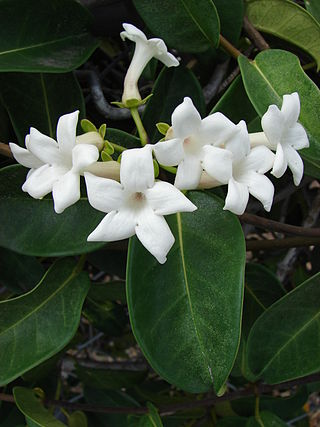
Marsdenia is a genus of plants in the family Apocynaceae first described as a genus in 1810. It is named in honor of the plant collector and Secretary of the Admiralty, William Marsden. The plants are native to tropical regions in Asia, Africa, Australia, and the Americas.

Matelea is a genus of flowering plants in the family Apocynaceae. It contains about 200 species, which are commonly known as milkvines. Some people consider Chthamalia to be a synonym to or a subgenus of Matelea.

Vincetoxicum is a genus of plants in the family Apocynaceae. Although the species in Vincetoxicum have sometimes been included in Cynanchum, chemical and molecular evidence shows that Vincetoxicum is more closely related to Tylophora, now included in Vincetoxicum. The generic name means "poison-beater" in Botanical Latin because of the plants' supposed antidotal effects against snakebite.
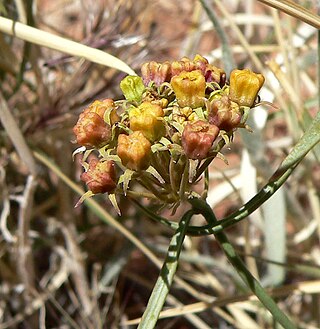
Funastrum utahense, synonym Cynanchum utahense, is a species of flowering plant in the genus Funastrum of the family Apocynaceae, known by the common names Utah swallow-wort and Utah vine milkweed. This relatively uncommon perennial vine is native to the Mojave Desert from California, Nevada, Utah and Arizona in the United States. This is a small vine with a highly branched, twining stem rarely exceeding a meter in length with which it physically supports itself on other shrubs and trees. It has small narrow leaves a few centimeters long. Its flowers are bright yellow to orange and grow in umbels. The fruit is a grooved follicle several centimeters long.
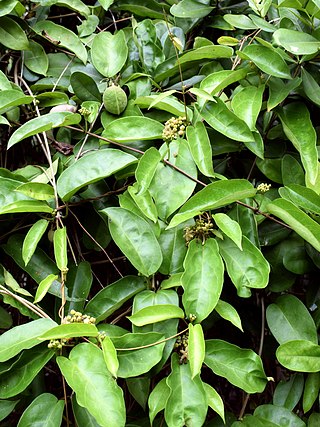
Sarcolobus is a plant genus in the family Apocynaceae, first established as a genus in 1809. It is native from Bangladesh through Southeast Asia, to New Guinea, Australia, and certain islands of the Western Pacific.
Dischidanthus is a genus of plants in the family Apocynaceae, first described as a genus in 1936. Species of the genus are native from the east Himalayas to south China and Peninsular Malaysia. It may be treated by some sources as a synonym of Marsdenia.
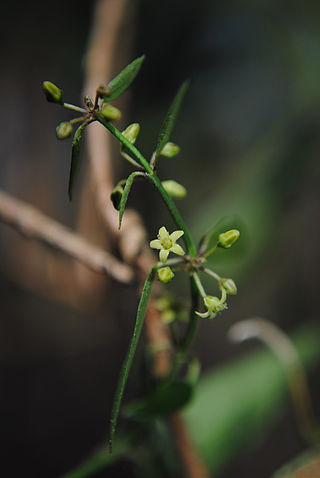
Orthosia is a genus of plants in the family Apocynaceae, first described as a genus in 1844.
Tassadia is a genus of plants in the family Apocynaceae, first described as a genus in 1844. It is native primarily to South America, with one species extending north into Central America, S Mexico, and Trinidad.

Philibertia is a genus of flowering plants in the family Apocynaceae, first described as a genus in 1819. It is native to South America.
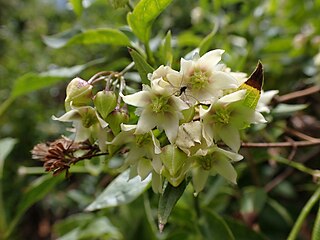
Jobinia is a genus of flowering plants of the family Apocynaceae first described in 1885. It is native to South America and Central America.
Kerbera is a genus of plants in the family Apocynaceae first established in 1885. It contains only one known species, Kerbera eichleri, endemic to Brazil.
Petalostelma is a genus of flowering plants in the family Apocynaceae, first described as a genus in 1885. They are native to South America.
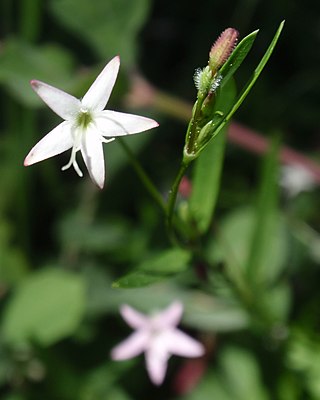
Kelloggia is a plant genus in the bedstraw and madder family, Rubiaceae. Its two species have a discontinuous distribution; one species is native to Bhutan and China, the other to the western United States.

Ruehssia is a genus of plants in the family Apocynaceae. It is also in the Asclepiadoideae subfamily and Marsdenieae tribe.












